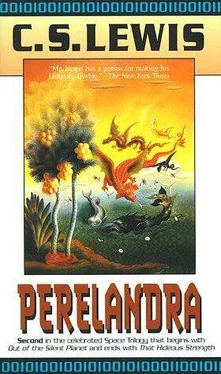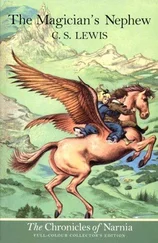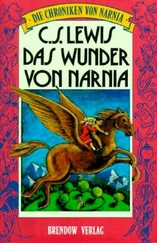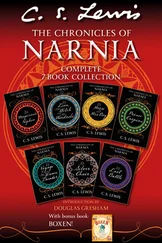Clive Lewis - Perelandra
Здесь есть возможность читать онлайн «Clive Lewis - Perelandra» — ознакомительный отрывок электронной книги совершенно бесплатно, а после прочтения отрывка купить полную версию. В некоторых случаях можно слушать аудио, скачать через торрент в формате fb2 и присутствует краткое содержание. Жанр: Религиоведение, Фэнтези, на английском языке. Описание произведения, (предисловие) а так же отзывы посетителей доступны на портале библиотеки ЛибКат.
- Название:Perelandra
- Автор:
- Жанр:
- Год:неизвестен
- ISBN:нет данных
- Рейтинг книги:4 / 5. Голосов: 1
-
Избранное:Добавить в избранное
- Отзывы:
-
Ваша оценка:
- 80
- 1
- 2
- 3
- 4
- 5
Perelandra: краткое содержание, описание и аннотация
Предлагаем к чтению аннотацию, описание, краткое содержание или предисловие (зависит от того, что написал сам автор книги «Perelandra»). Если вы не нашли необходимую информацию о книге — напишите в комментариях, мы постараемся отыскать её.
Perelandra — читать онлайн ознакомительный отрывок
Ниже представлен текст книги, разбитый по страницам. Система сохранения места последней прочитанной страницы, позволяет с удобством читать онлайн бесплатно книгу «Perelandra», без необходимости каждый раз заново искать на чём Вы остановились. Поставьте закладку, и сможете в любой момент перейти на страницу, на которой закончили чтение.
Интервал:
Закладка:
C. S. Lewis
Perelandra
PREFACE
This story can be read by itself but is also a sequel to Out of the Silent Planet in which some account was given of Ransom’s adventures on Mars-or, as its inhabitants call it, Malacandra. All the human characters in this book are purely fictitious and none of them is allegorical.
C.S.L.
CHAPTER ONE
As I left the railway station at Worchester and set out on the three-mile walk to Ransom’s cottage, I reflected that no one on that platform could possibly guess the truth about the man I was going to visit. The flat heath which spread out before me (for the village lies all behind and to the north of the station) looked like an ordinary heath. The gloomy five-o’clock sky was such as you might see on any autumn afternoon. The few houses and the clumps of red or yellowish trees were in no way remarkable. Who could imagine that a little farther on in that quiet landscape I should meet and shake by the hand a man who had lived and eaten and drunk in a world forty million miles distant from London, who had seen this Earth from where it looks like a mere point of green fire, and who had spoken face to face with a creature whose life began before our own planet was inhabitable?
For Ransom had met other things in Mars besides the Martians. He had met the creatures called eldila, and specially that great eldil who is the ruler of Mars or, in their speech; the Oyarsa of Malacandra. The eldila are very different from any planetary creatures. Their physical organism, if organism it can be called, is quite unlike either the human or the Martian. They do not eat, breed, breathe, or suffer natural death, and to that extent resemble thinking minerals more than they resemble anything we should recognise as an animal. Though they appear on planets and may even seem to our. senses to be sometimes resident in them, the precise spatial location of an eldil at any moment presents great problems. They themselves regard space (or “deep Heaven’) as their true habitat, and the planets are to them not closed worlds but merely moving points-perhaps even interruptions-in what we know as the Solar System and they as the Field of Arbol.
At present I was going to see Ransom in answer to a wire which had said “Come down Thursday if possible. Business.” I guessed what sort of business he meant, and that was why I kept on telling myself that it would be perfectly delightful to spend a night with Ransom and also kept on feeling that I was not enjoying the prospect as much as I ought to. It was the eldila that were my trouble. I could just get used to the fact that Ransom had been to Mars . . . but to have met an eldil, to have spoken with something whose life appeared to be practically unending . . . Even the journey to Mars was bad enough. A man who has been in another world does not come back unchanged. One can’t put the difference into words. When the man is a friend it may become painful: the old footing is not easy to recover. But much worse was my growing conviction that, since his return, the eldila were not leaving him alone. Little things in his conversation, little mannerisms, accidental allusions which he made and then drew back with an awkward apology, all suggested that he was keeping strange company; that there were-well, Visitors-at that cottage.
As I plodded along the empty, unfenced road which runs across the middle of Worchester Common I tried to dispel my growing sense of malaise by analysing it. What, after all, was I afraid of? The moment I had put this question I regretted it. I was shocked to find that I had mentally used the word “afraid”. Up till then I had tried to pretend that I was feeling only distaste, or embarrassment, or even boredom. But the mere word afraid had let the cat out of the bag. I realised now that my emotion was neither more, nor less, nor other, than Fear. And I realised that I was afraid of two things-afraid that sooner or later I myself might meet an eldil, and afraid that I might get “drawn in”. I suppose everyone knows this fear of getting “drawn in”-the moment at which a man realises that what had seemed mere speculations are on the point of landing him in the Communist Party or the Christian Church-the sense that a door has just slammed and left him on the inside. The thing was such sheer bad luck. Ransom himself had been taken to Mars (or Malacandra) against his will and almost by accident, and I had become connected with his affair by another accident. Yet here we were both getting more and more involved in what I could only describe as inter-planetary politics. As to my intense wish never to come into contact with the eldila myself I am not sure whether I can make you understand it. It was something more than a prudent desire to avoid creatures alien in kind, very powerful, and very intelligent. The truth was all that I heard about them served to connect two things which our mind tends to keep separate, and that connecting gave me a sort of shock. We tend to think about non-human in two distinct categories which we label “scientific” and “supernatural” respectively. We think, in one mood, of Mr Wells” Martians (very unlike the real Malacandrians, by the bye), or his Selenites. In quite a different mood we let our minds loose on the possibility of angels, ghosts, fairies, and the like. But the very moment we are compelled to recognise a creature in either class as real the distinction begins to get blurred: and when it is a creature like an eldil the distinction vanishes altogether. These things were not animals-to that extent one had to classify them with the second group; but they had some kind of material vehicle whose presence could (in principle) be scientifically verified. To that extent they belonged to the first group. The distinction between natural and supernatural, in fact, broke down; and when it had done so, one realised how great a comfort it had been-how it had eased the burden of intolerable strangeness which this universe imposes on us by dividing it into two halves and encouraging the mind never to think of both in the same context. What price we may have paid for this comfort in the way of false security and accepted confusion of thought is another matter.
“This is a long, dreary road,” I thought to myself. “Thank goodness I haven’t anything to carry.” And then, with a start of realisation, I remembered that I ought to be carrying a pack, containing my things for the night. I swore to myself. I must have left the thing in the train. Will you believe me when I say that my immediate impulse was to turn back to the station and “do something about it”? Of course there was nothing to be done which could not equally well be done by ringing up from the cottage. That train, with my pack in it, must by this time be miles away.
I realise that now as clearly as you do. But at the moment it seemed perfectly obvious that I must retrace my steps, and I had indeed begun to do so before reason or conscience awoke and set me once more plodding forwards. In doing this I discovered more clearly than before how very little I wanted to do it. It was such hard work that I felt as if I were walking against a headwind; but in fact it was one of those still, dead evenings when no twig stirs, and beginning to be a little foggy.
The farther I went the more impossible I found it to think about anything except these eldila. What, after all, did Ransom really know about them? By his own account the sorts which he had met did not usually visit our own planet-or had only begun to do so since his return from Mars. We had eldila of our own, he said, Tellurian eldils, but they were of a different kind and mostly hostile to man. That, in fact, was why our world was cut off from communication with the other planets. He described us as being in a state of siege, as being, in fact, an enemy-occupied territory, held down by eldils who were at war both with us and with the eldils of “deep Heaven”, or “space”. Like the bacteria on the microscopic level, so these co-inhabiting pests on the macroscopic permeate our whole life invisibly and are the real explanation of that fatal bent which is the main lesson of history. If all this were true, then, of course, we should welcome the fact that eldila of a better kind had at last broken the frontier (it is, they say, at the Moon’s orbit) and were beginning to visit us. Always assuming that Ransom’s account was the correct one.
Читать дальшеИнтервал:
Закладка:
Похожие книги на «Perelandra»
Представляем Вашему вниманию похожие книги на «Perelandra» списком для выбора. Мы отобрали схожую по названию и смыслу литературу в надежде предоставить читателям больше вариантов отыскать новые, интересные, ещё непрочитанные произведения.
Обсуждение, отзывы о книге «Perelandra» и просто собственные мнения читателей. Оставьте ваши комментарии, напишите, что Вы думаете о произведении, его смысле или главных героях. Укажите что конкретно понравилось, а что нет, и почему Вы так считаете.












